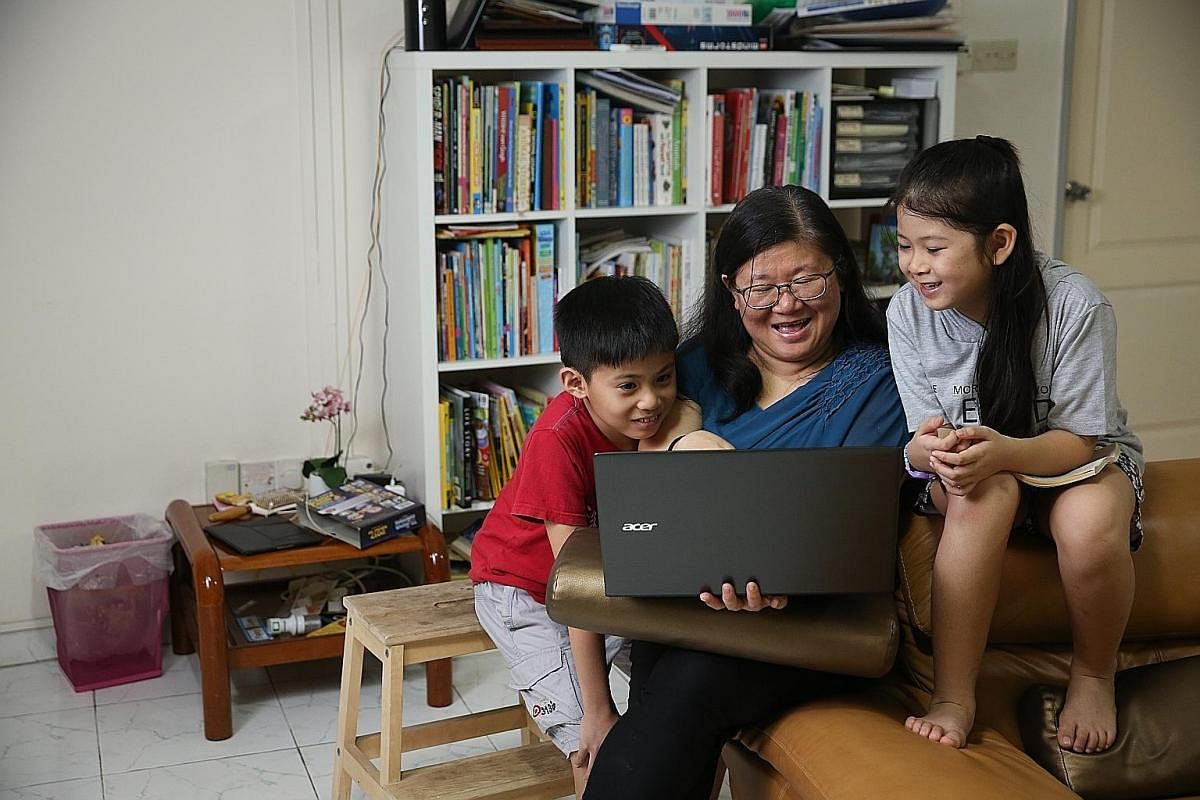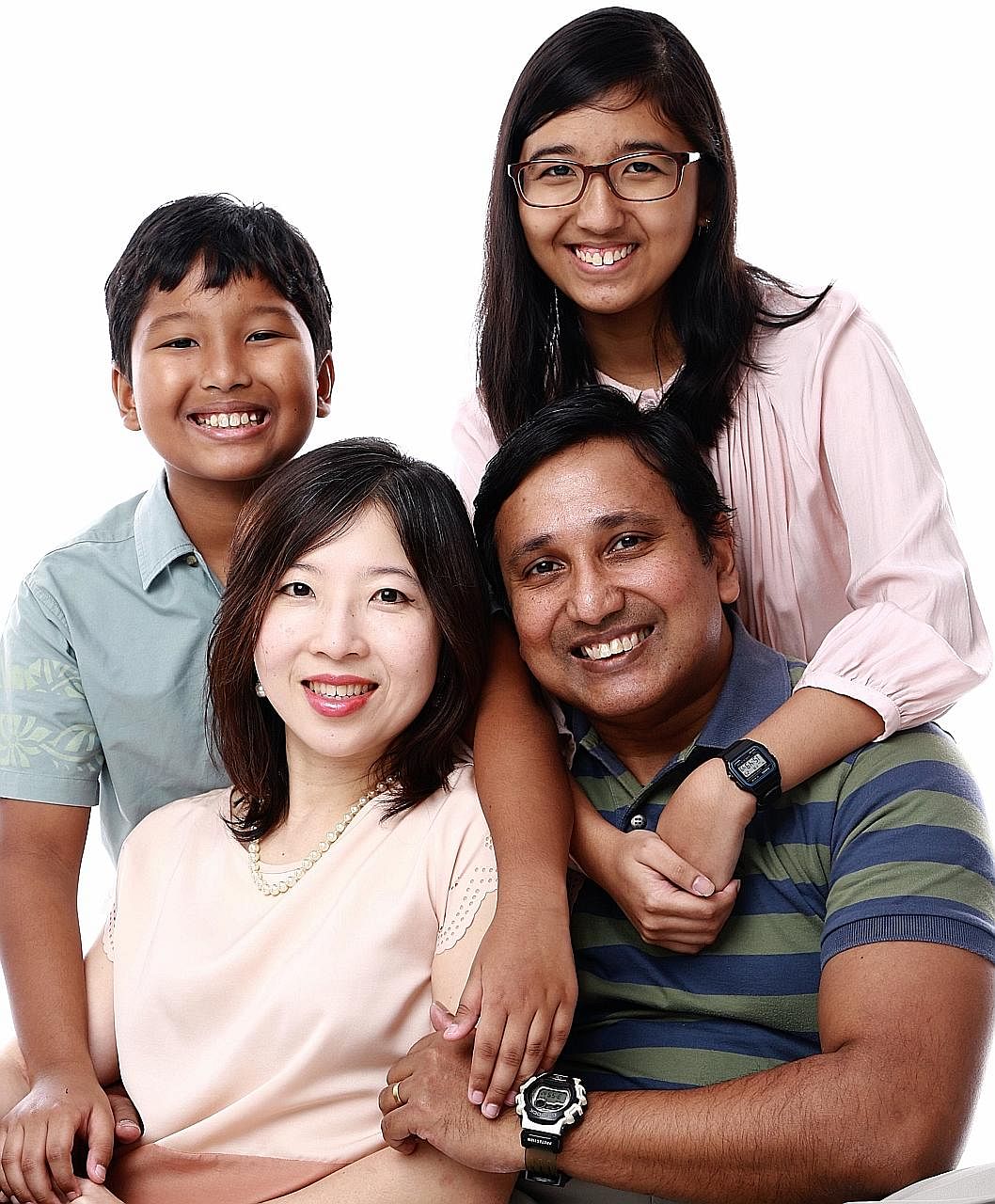Teaching kids to sniff out fake news
With the pervasiveness of the Internet, parents see the importance of teaching their kids to discern and verify information

Siblings Kam Hao Re, 10, and Kam Xi Yu, eight, heard about false online rumours regarding rice made of plastic at their primary school last year as part of their teachers' efforts to educate pupils about fake news.
The teachers debunked the "news" as part of a cyber-awareness exercise and Xi Yu learnt that not all information sources are reliable.
At home, their parents help them verify information by supervising their Google searches. In recent years, allegations about plastic rice being sold in Asia have surfaced periodically.
Their mother, Madam Seng Tzer Jing, 43, says: "At their age, since they don't use the Internet much, it is easy to ask their teachers and parents for help (in verifying what is true and false)."
Madam Seng, a scientist, is married to architect Kam Yau Fat, 42. She also writes a parenting blog called The Kam Family "Raising Children in Singapore".
Fake news, which is characterised by the spread of false, often sensational, information, is a growing problem around the world. If unchecked, the dissemination of fake news can erode trust in public institutions and destabilise societies, experts say.

In Singapore, Parliament voted unanimously earlier this month to form a select committee to examine the causes and effects of deliberate falsehoods online.
To help their students tackle the problem of fake news, some polytechnics and universities here have introduced courses on topics such as media and digital information literacy, The New Paper reported this month.
For younger children, however, parents are employing a variety of ways to help them discern between genuine and false information, such as limiting and supervising Internet use.
In distinguishing between fake and genuine news, some parents start guiding their children from a young age by questioning the veracity of fairy tales and other ageappropriate stories.
Others, such as Madam Seng, find that curbs on screen-time can be a good tool to prevent the kids from being swamped by information that can sometimes be dubious.
She says there is too much information online for her children to navigate unguided. She also does not want them to get hooked on screens. She and her husband make it a point to oversee their children's use of the Internet.
Hao Re, a Primary 4 pupil, and Xi Yu, who is in Primary 3, are allowed screen-time for half an hour a day, twice a week. The family's gadgets, such as smartphones and laptops, are locked with passwords only the adults know.
Madam Seng also encourages her children to use dictionaries and encyclopaedias to look up topics of interest or to verify pieces of information they may come across.
Experts say it is good to start children young, even if they are too small to understand the concept of fake news.
Ms Sarah Chua, parenting specialist at Focus on the Family Singapore, says: "Younger children might struggle to understand how news can be fake and the complex underlying issues. Parents will need to cater their message to their children in an age-appropriate manner.
"For example, younger children may be receiving fake news from hearsay. Parents need to address the need to not just believe what they hear from their peers as facts, but to also encourage their children to clarify such news with their parents."
Mrs Wai Yin Pryke, director of the National Library, says: "Parents naturally teach their children about what is real and what is fake from a young age. Children are taught not to believe strangers who may approach them and claim that they are sent by their parents. They would be taught to ask further questions and not to take the information at face value."
The National Library has an information literacy programme, with the acronym S.U.R.E., a portal that parents can use to teach children about fake news through accessing infographics, online articles and videos.
S.U.R.E. stands for Source, ensuring the source of information is credible; Understand, searching for facts rather than opinion; Research, investigating and comparing the information with multiple sources; and Evaluate, that is, looking at the issue from different angles and exercising fair judgment.
Ms Carol Loi, 47, has been teaching her two secondary-school-aged daughters to discern truth from fiction from the time they were young, years before fake news became the topic du jour.
"It's not about fake news per se. This sense of what is real or not real is a life skill. It's part of parenting to teach what is true or not true," says Ms Loi, who is the founder of a firm engaged in digital literacy education.
Married to a 49-year-old project director in a construction firm, the couple's two daughters are Nicole, 15, a Sec 4 student, and Gillian, 12, who is in Sec 1.
Before her daughters were in school, Ms Loi had conversations with them about whether fairy tales and Santa Claus were real. When they saw scenes that frightened them in movies, she would reassure them that they were not real.
Now that Nicole and Gillian are adolescents, she has discussions with them about discerning what is accurate in the news or in social media.
She reminds her children to check sources and not to react instinctively to news or images that evoke strong emotions, such as anger, which may be the goal of some fake news.
This discernment extends to talking about misleading photographic or advertising images, she says.
Mindful of body image issues many young people face, she has shown them, for instance, photos of Instagrammers who pose in a way that makes them look thinner by adjusting their shoulders, posture and angle.
Other pointers for guiding older children to distinguish between false and genuine news include checking for clues. Fake news items may have unusual URLs or Web addresses, or spelling or grammatical errors, says Ms Fiona Walker, group managing director of Julia Gabriel Education, which provides education and enrichment for children.
Fake news can be so prevalent that people can become desensitised to it, says lawyer Claire Nazar, 46, who is also a council member of Families for Life, an organisation that promotes strong families.
On the other hand, she says that her children - students Hosanna, 20, and Elijah-John, 14 - are so inured to the proliferation of fake news that they take such reports with a pinch of salt. It is sometimes the parents who are less sceptical and circulate messages about fake news, she says.
"Sometimes, parents circulate such messages out of fear or protectiveness for their children, or even a sense of public duty," says Mrs Nazar, who has received messages such as alleged health scares that circulate widely. She is married to fellow lawyer Boaz Nazar, 51.
Recently, claims that circulated on social media of attempted kidnapping of children proved to be false.
Her daughter, Hosanna, says: "I usually get my news from a newspaper app. I don't really get it from social media sites, which may not be reliable. Whenever I see an article on Facebook, I always check the source it came from, which my mum has taught me."
The possibility of social chagrin prevents her from reposting social media messages that may not be immediately verifiable as true.
Hosanna says sometimes fake celebrity news can fool many people, such as a recent fake trailer claiming a reunion movie for the popular Friends series of the 1990s. She did not repost that fake news claim, though some of her friends did.
Hosanna says: "We don't tend to share it unless we know for a fact that it's real. If you share something that's fake, your friends make fun of you. I don't share (social media posts) until I've done my research."
Join ST's Telegram channel and get the latest breaking news delivered to you.
A version of this article appeared in the print edition of The Sunday Times on January 28, 2018, with the headline Teaching kids to sniff out fake news. Subscribe

